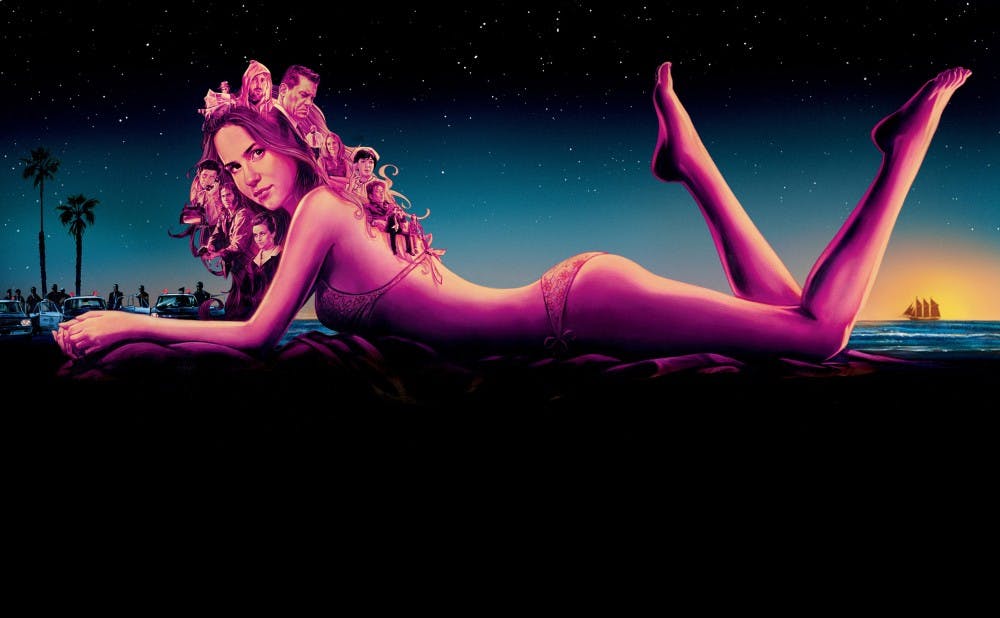Sex, lies and videotape; sex, drugs and rock and roll: these are the overlapping triumvirates governing Inherent Vice, Paul Thomas Anderson's film adaptation of Thomas Pynchon's novel set in the Los Angeles suburbs at the beginning of the 1970's.
The plot revolves around private investigator Doc Sportello (Joaquin Phoenix) as he meanders around the city in search of his "ex-old lady," Shasta Fay Hepworth (Katherine Waterston), and her new lover, real estate developer Mickey Wolfmann (Eric Roberts)––both of whom have mysteriously disappeared. Along the way, he uncovers, among other things, a web of crime involving L. A. zoning policy, zombified surf-rock bands and a dentistry enterprise calling itself the "Golden Fang."
Los Angeles, in Pynchon's vision, is too far from Woodstock and Vietnam to provide either with anything but a passing mention; his characters are instead interested in everything else that pops up on the local news. Richard Nixon, Charles Manson, Ronald Reagan and the long-dead John Garfield all haunt the original novel and its film adaptation, first appearing spectrally on Doc's television and soon after in his raps with suspects, clients and lovers.
The novel matters for a number of reasons: namely, it is the first of the elusive author's books to be set to film, and that film follows its source material very closely. Much of the dialogue and narration in the script have been lifted directly from the novel's pages, and the assembled cast (the best of whom include Michael K. Williams, Owen Wilson and, for once sans harp and harpsichord, Joanna Newsom) shows that Pynchon's dry humor can only be amplified by the addition of sound and visuals. For Inherent Vice is, above all, a comedy––and an artful one at that. Anderson, who managed to draw levity from the baptismal fonts and oil wells of There Will Be Blood, allows the story and its humor to develop naturally through long takes and reefer-saturated dolly shots.
But Anderson's greatest success, and one that has not been appreciated by many of the film's lukewarm reviews, is the way he translates Pynchon's text into a visual tool. Unlike Baz Luhrmann's treacly adaptation of F. Scott Fitzgerald's writing onscreen in The Great Gatsby, Anderson's fashioning of the text into voice-over narration subverts the relationship between image and the written word in the original work. Even as the televised apparitions of Nixon and Manson bend the gazes of Doc and company, the narration – which, in one of the film's best changes to its source material, is provided by the dilettante sorceress Sortilège (Newsom) – is the stem from which all the images onscreen extend. Essentially, Anderson has imposed on Inherent Vice the same kind of nebulous bureaucracy that its protagonists stumble upon and uncover across Los Angeles.
The text seeps into Anderson's adaptation in other ways, as well. Doc Sportello, who, when asked how many joints he smokes on a given day, says that he needs to "check the log book" – Doc has what Pynchon refers to as "Doper's Memory." And while, in the novel, Pynchon usually explains outright when Doper's Memory strikes Doc, Anderson does the opposite. There are times when a song that is being played in the background will carry on long after a scene has ended, only to cut off abruptly. In an especially brilliant move, Neil Young's "Journey Through the Past," played earlier in the film, returns, barely audible, as a secretary puts a caller on hold. Characters, too, disappear from the frame only to reappear soon afterward, and phantasmal voices echo without bodies to accompany them. Anderson musters a wide range of visual and sonic effects to subtly transform Doc's drug-induced disability into part of the viewer's vision of Los Angeles, a city whose ghosts are decidedly more alive than dead.
It is uncertain whether Inherent Vice will remain the only Pynchon novel to be adapted to film – the motion picture industry has taken a long time to requite the writer's love, and perhaps with good reason: his more infamous works vacillate so impossibly between the familiar and the esoteric, the vulgar and the urbane, that the idea of putting them on the screen seems as terrifying as it does difficult. But even if it is the last, Anderson's Inherent Vice exhibits the kind of masterful interplay between images and words that is to be expected from Pynchon himself.
Get The Chronicle straight to your inbox
Signup for our weekly newsletter. Cancel at any time.

